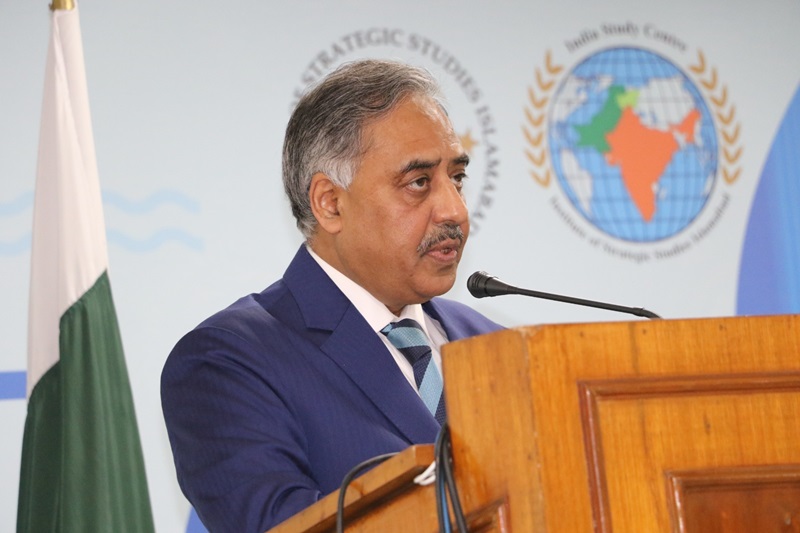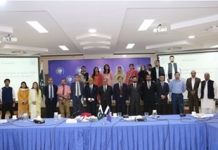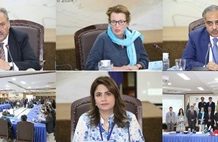Remarks by DG ISSI Ambassador Sohail Mahmood at the
“Next Generation International Security Experts Conference 2024”
ISSI, 7 March 2024

As the world continues to witness an ever-changing, increasingly complex, and highly uncertain global environment, the challenges of scholarship and statecraft keep on compounding for all the actors. Fathoming the breath-taking pace and scale of the change is in itself a tall order. An even taller order is to determine ways to negotiate that change and to choose the best way forward. As a famous saying goes: “We make our choices, and then our choices make us.” The stakes could not be higher.
Good choices depend on how accurately we assess the strategic environment; how clear we are about our core interests; and how effectively we can employ the means at our disposal to achieve our desired ends. As such, sound decision-making is largely contingent upon the quality of our information and situational awareness as well as a clear sense of our weaknesses and strengths. Policy formulation, backed up by good research and broader consultation with relevant stakeholders, is pivotal.
ISSI is holding today’s conference with all these considerations in view. Firstly, it is important in these turbulent times to go beyond the traditional approaches, put on some new lenses, and employ fresh thinking. This will inevitably come from the younger and more imaginative minds. Secondly, forming the largest segment of Pakistan’s demographic landscape today, the youth is an indispensable stakeholder insofar as the future of Pakistan is concerned. Hence, this outreach to NextGen international security experts, which is also consistent with our new vision at ISSI.
Our India Study Centre initiated the process of engaging the young experts in October 2023. Following the first call, a total of 130 abstracts were received, including some from abroad as well. After a blind review, 25 abstracts were selected and eventually 11 research papers were shortlisted, which will be presented today.
The focus of the papers being presented is on three different dimensions of the security environment in South Asia:
-
- Firstly, terrorism and violent extremism that continues to pose a significant threat to the region, including Pakistan. Terrorist groups are using sophisticated tactics to carry out attacks, and are increasingly utilizing technology to disseminate their message and recruit new members. The rise of extremist ideologies and the radicalization of individuals is a growing concern for governments around the world.
-
- Secondly, strategic instability and potential of conflict in South Asia, which pose a significant threat to international security as well. As the region is attempting to harness the potential of emerging technologies, risks to strategic stability can escalate quickly. Even the possibility of inadvertent use of major weapons due to the malfunctioning of emerging technologies demands new measures.
-
- Thirdly, non-traditional security threats and challenges such as climate change, pandemics, food insecurity having a profound impact on the region. The effects of climate change, such as rising sea-levels and extreme weather conditions, can lead to displacement, economic instability, and conflict. This is an existential threat and a global concern which requires a coordinated response from governments, businesses, and communities across regions.
Given the complex and multifaceted nature of these threats and challenges, the need for multi-dimensional perspectives and multi-stakeholder inputs can hardly be over- emphasized. It is hoped that our young, next generation experts will present thoughtful analyses and offer innovative solutions.
We are privileged to have three distinguished academics join us as ‘Mentors’ for the three working sessions. I extend a special welcome to Dr. Muhammad Khan from International Islamic University; Dr. Adil Sultan from Air University; and Dr. Adam Saud from Bahria University. They will share their evaluation of the papers presented in their respective sessions and offer insightful comments and suggestions to the young experts. We are grateful to them for agreeing to provide valuable guidance, which would from part of the researchers’ training and grooming.
I also extend a warm welcome to Additional Secretary (Asia-Pacific) Ambassador Imran Siddiqui, representing the Ministry of Foreign Affairs. It has been our constant endeavour to bridge the gap that has traditionally existed between the research and policy communities. Ambassador Imran Siddiqui’s participation testifies to the Foreign Ministry’s commitment to strengthen its interface with think-tanks and imbibe from their work. I am sure, our presenters would benefit immensely from his rich perspectives and wise counsel.
For my part, I conclude by offering some simple advice to our NextGen experts: As you work through your professional life in the years to come, be bold and innovative in your thinking, open and flexible in adapting to new technologies and working methods, and hardworking and persistent in pursuing your goals. Above all, do your work with utmost commitment, professionalism, and integrity. If you do so, there will be no limit to what you can contribute to your profession and to the nation. May God be with you. Ameen!











